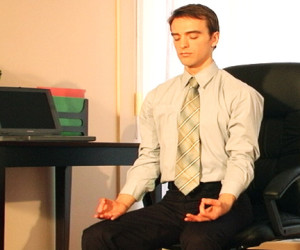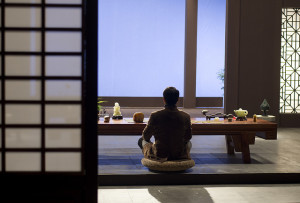Meditation and Stress

Meditation and Stress
By Dr. Graham Dixon
If you’ve flown in the US in the past ten years, you’ll have plenty of reasons to resent the Transport Security Administration. I have found the experience of being interrogated and prodded by these people to be a humiliating imposition amidst the generally happy experience of getting out of Boston for a while. Going through security was something to dread, a moment (quite perversely) of severe insecurity. My attitude to it became resistant, even rebellious; I refused to go through the millimetric scanner and suffered borderline sexual indignity as a result. The stress thus generated was promptly fed into my surroundings, driving my long-suffering wife completely up the wall, and with good reason; who wants to travel with an angry, whining, Zeitgeist-quoting misanthrope?
We all experience stress. Some of it, including my dysfunctional relationship with the TSA, stems from powerlessness, a grating frustration caused by being prevented from doing the simple thing I want to do – travel with dignity and enjoyment. Much of our stress seems to come from uncertainty: will the boss accept my proposal? Will the professor laugh derisively at my hastily thrown-together presentation? Will the Red Sox get it together and bring joy to Boston once more? (Apologies to Cardinals fans, or Yankees fans for that matter; I grew up in Britain, so I don’t really follow baseball; I just like it when my town is happy.)

A few years ago, I began noticing that my stresses, the things in my life I was worrying about, seemed not to change or improve, no matter how much I worried about them. Laying awake for three hours imagining the impending horrors of my Doctoral qualifying exams was a dreadful experience, and so were the exams themselves, but those three hours brought me no closer to the sunlit meadows of graduation because they simply failed to address the problem. Walking around with a lead ball in my gut, waiting for the USCIS to finally approve my Green Card and reunite me with my wife after a year apart, did nothing to accelerate their sloth-like administrative processes.
Worrying, I came to understand, is a complete waste of everyone’s time. The Japanese have a lovely expression, Shikata Ga Nai, which roughly translates as, ‘there’s nothing that can be done about it’. I found this in Kim Stanley Robinson’s epic and tremendous Mars Trilogy and found myself saying it more and more as I gained clarity as to what aspects of the reality which surrounded me were flexible, and which were not. The old Serenity Prayer is a Christian’s way of expressing this:
God grant me the serenity
To accept the things I cannot change;
The courage to change the things I can;
And the wisdom to know the difference.
It was just such wisdom that I started to gain as I began meditating. For whatever reason, such realizations did not come until I spent time sitting. This has done two things: it has caused a regret that I did not gain this insight earlier; it has also given me the understanding that such regret, fretting endlessly over past mistakes, is totally pointless.
So, I spent three or four years seething my way through airport security, on both sides of the Atlantic. Then, very suddenly, I cracked it:
Don’t pay attention to the unchangeable negative.
Instead, pay attention to the richly available positive.
Here, then, is a transcription of my inner monologue as I passed through Washington National Airport recently:
The line is long. It will move exactly as fast as it moves, and no amount of willing
it to accelerate will change this. Focus on the breath, then, in-out, in-out, in-out until it’s my turn.
Feel the fabric of the shoelaces under my busy fingers as I untie them. Feel the
change in temperature and the new sensation of the cool floor under my feet,
the sound of my shoes settling in the gray box on the conveyor belt. Breathe: in-out, in-out.
Notice each step towards the scanner, left-right-left, a little private, ten-step
walking meditation. Stand on the yellow foot marks, noticing how my feet
contrast with the default shapes painted on the floor. It’s only three seconds;
feel how richly expansive three seconds can be. Breathe, in-out, while they
invade my privacy in ways I cannot remotely hope to prevent. Shikata Ga Nai.
Breathe my way to the end of the conveyor, smile sympathetically to the blonde
woman with three bags and two trays full of jewelry as she struggles to reattach
her bizarrely oversized belt. Feel the floor again, flat and cool and a little
slippery. Rejoice quietly as my bag emerge; feel the fabric of the black handle,
the weight of it in my hand. Notice the deep blue of the guard’s uniforms, the
cool, curly hair of one of the female officials who’s laughing delightedly with her
colleague.
The familiar intimacy of feet sliding into shoes. The security of the belt
reattached. The satisfying completeness, once more, of my little ensemble of
traveler’s necessities: bag, boarding pass, phone, wallet. Stand up slowly, search
for the signs to my gate, breathe relaxedly and slowly. Walk steadily, carefree, to
the gate in plenty of time for my flight.
There, that wasn’t so bad, was it?
When my doctoral qualifying exams were upon me, terrifying and unwelcome, I had the beginnings of this priceless skill already in place. The oral exam, perhaps the peak of graduate school discomfort, was an hour of high-pressure, winner-takes-all discussion with three luminaries in my field. Failing here would have set back my graduation, my job search, and my mental state in ways which were too awful to contemplate.

So I didn’t contemplate them. I walked into the exam, and breathed. I introduced myself to the one unfamiliar professor, breathed some more, and began answering questions. Early on, I was shown a passage of orchestral music which needed to be transposed; French horns are pitched in F, and I was asked to describe the chords as they would sound, not as I saw them.
In one of the most inexplicable events of my lifelong musical career, I froze completely. For the life of me, in that silent, panicked, palpitating thirty seconds, I could not see or hear those chords as they would truly have sounded. I asked for a moment to collect myself and sat back in the chair, unscrewing the lid from a flask of Chinese tea I had wisely brought to
the exam. I listened intently to the pacifying sound of pouring tea. I watched with laser-sharp focus as the hot liquid was tipped, with great care, into my cup. I watched the freshly poured mug of jasmine tea settle quickly as I put down the flask. Picking it up, I was acutely aware of the new warmth in my hand, the extraordinary, healing aroma of the brew, thealmost punishing heat of that first, life-giving sip.
I set down the cup, turned back to the orchestral excerpt, studied it for ten seconds and answered the question, without fault. At least, I assume I did; I passed the exam first time, an achievement which might very well have proved impossible without mindfulness, without focusing on positive, beautiful things in the midst of appalling stress. That simple shift of focus brought great dividends, and not just because I could graduate; it taught me the power of controlling my focus, directing it to just where I want it.
So, I invite you to breathe your way mindfully through the clutter and haste and unwelcome things. Notice those little reflections of the true depth of available reality. Give yourself time to access the giant family of sensory experiences which are open to us all, wherever and whenever. Feel and breathe; notice and breathe; smile and breathe, and breathe and
breathe and breathe.
Yours in the Dharma,
Dr. Graham Dixon
